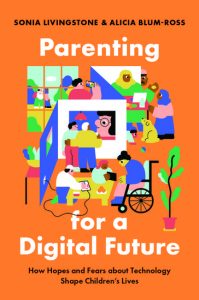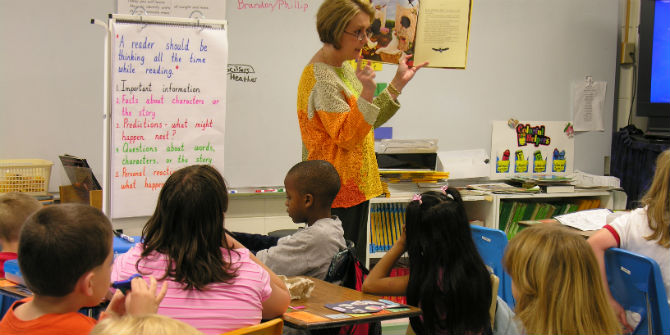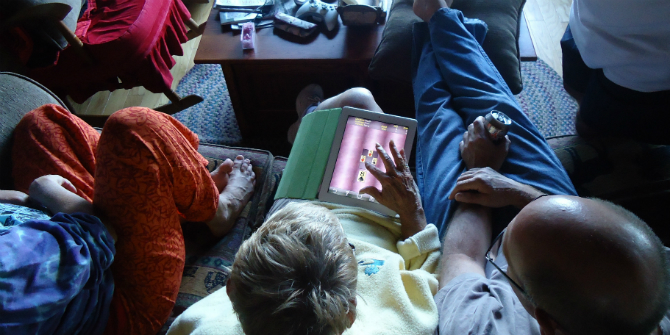 Society has high hopes and considerable fears for the digital future. On the one hand, parents are told – get your children coding so they have the digital skills needed for a competitive future. On the other hand, they are old – millions of jobs will be lost to digital robots by 2030 – exactly the date by which many of today’s children will be adults looking for work. Professor Sonia Livingstone discusses how our hopes and fears about technology shape children’s lives and the findings from her newly published book with Dr Alicia Blum-Ross.
Society has high hopes and considerable fears for the digital future. On the one hand, parents are told – get your children coding so they have the digital skills needed for a competitive future. On the other hand, they are old – millions of jobs will be lost to digital robots by 2030 – exactly the date by which many of today’s children will be adults looking for work. Professor Sonia Livingstone discusses how our hopes and fears about technology shape children’s lives and the findings from her newly published book with Dr Alicia Blum-Ross.
Grand predictions about the future add to our anxieties, and contradictory injunctions just confuse and undermine parents. After all, parents are looking for practical ways to shape their children’s digital lives positively, if they can. So, how should parents prepare their child for the digital future? A good place to start is to recognise, and not underestimate, the efforts parents are already making to influence their children’s life chances. And then to find ways for society to support them better.
But it’s hard for them, because there’s so many uncertainties about the digital future: should we encourage more screen use to gain those necessary digital skills for the future, or less screen use to avoid the claimed problems linked to screen time? Should parents be building robots with our children, and if so, how should they go about it? Digital technology raises hopes without explaining the steps needed to fulfil them. It promises outcomes that may not materialize. And it intensifies the opportunities and the risks we face, making us anxious.
 When we interviewed Lara about how she’s bringing up her 6-year old son with digital technology, she told us: “I’m very open, maybe too open.” But her husband Pavel was more cautious, saying “I need to stay on top of it.” Lara and Pavel come from different countries and cultures. As they figure out how to bring up Tomas in their new life together in London, like many parents they argue about what technology he can use – for Lara (originally from Brazil) it’s exciting, for Pavel (from Poland) it’s worrying. But more fundamentally, they’re arguing about how they want to live and who they want Tomas to be – open to change or cautious in the face of risk.
When we interviewed Lara about how she’s bringing up her 6-year old son with digital technology, she told us: “I’m very open, maybe too open.” But her husband Pavel was more cautious, saying “I need to stay on top of it.” Lara and Pavel come from different countries and cultures. As they figure out how to bring up Tomas in their new life together in London, like many parents they argue about what technology he can use – for Lara (originally from Brazil) it’s exciting, for Pavel (from Poland) it’s worrying. But more fundamentally, they’re arguing about how they want to live and who they want Tomas to be – open to change or cautious in the face of risk.
I suggest that, for many of us, the digital has become the terrain on which we negotiate who we are – our identities, relationships, values, and our children’s life chances. No wonder our anxieties and arguments about technology are so fraught. But also notice, this creates an opportunity to engage with parents positively.
So a crucial question is, how can society better support families in a digital age?
First, I suggest that we should stop scare-mongering, and telling parents to police their children’s screen time. Parents are trying to live more democratically with their children, respecting their views not policing them, spying on them or banning their pleasures. How does it help families facing all kinds of other difficulties to demand that they also control screen time? Why undermine parents who are developing creative or educational or coding opportunities by treating all screen time as if it were the same?
Official screen time advice is causing conflict in the family. There’s no solid evidence that more screen time increases childhood problems – especially by comparison with social, economic or psychological factors. Moreover, restricting children breeds resistance, while guiding them builds judgment. Actually, the same applies to parents!
So instead:
- We should encourage parents to evaluate what’s on the screen, how their child is interacting with it, and what they gain from the experience.
- Schools could embed digital literacy in the curriculum and foster positive connections with children’s digital lives outside the classroom.
- Librarians, health visitors and youth workers could guide parents in imaginative or educational digital choices.
- Government could address the risks, and facilitate the production of imaginative and educational content and ensure its availability for everyone.
- Since the digital is not everything, society could also provide more playgrounds and clubs for kids to get together, and more affordable activities for families outside the home.
As a society we are investing a lot in the digital future. But parents are the biggest influence on their children’s life chances. There’s no quick fix for challenges they are facing. Although it’s all too easy to criticise parents, I suggest that we should recognise the challenges they are facing, enhance the options available to them, and ask ourselves how we could support them better.
Notes
This text was originally published on The Children’s Media Foundation blog and has been re-posted with permission.
This post gives the views of the authors and does not represent the position of the LSE Parenting for a Digital Future blog, nor of the London School of Economics and Political Science.
Featured image: photo by Cottonbro on Pexels





